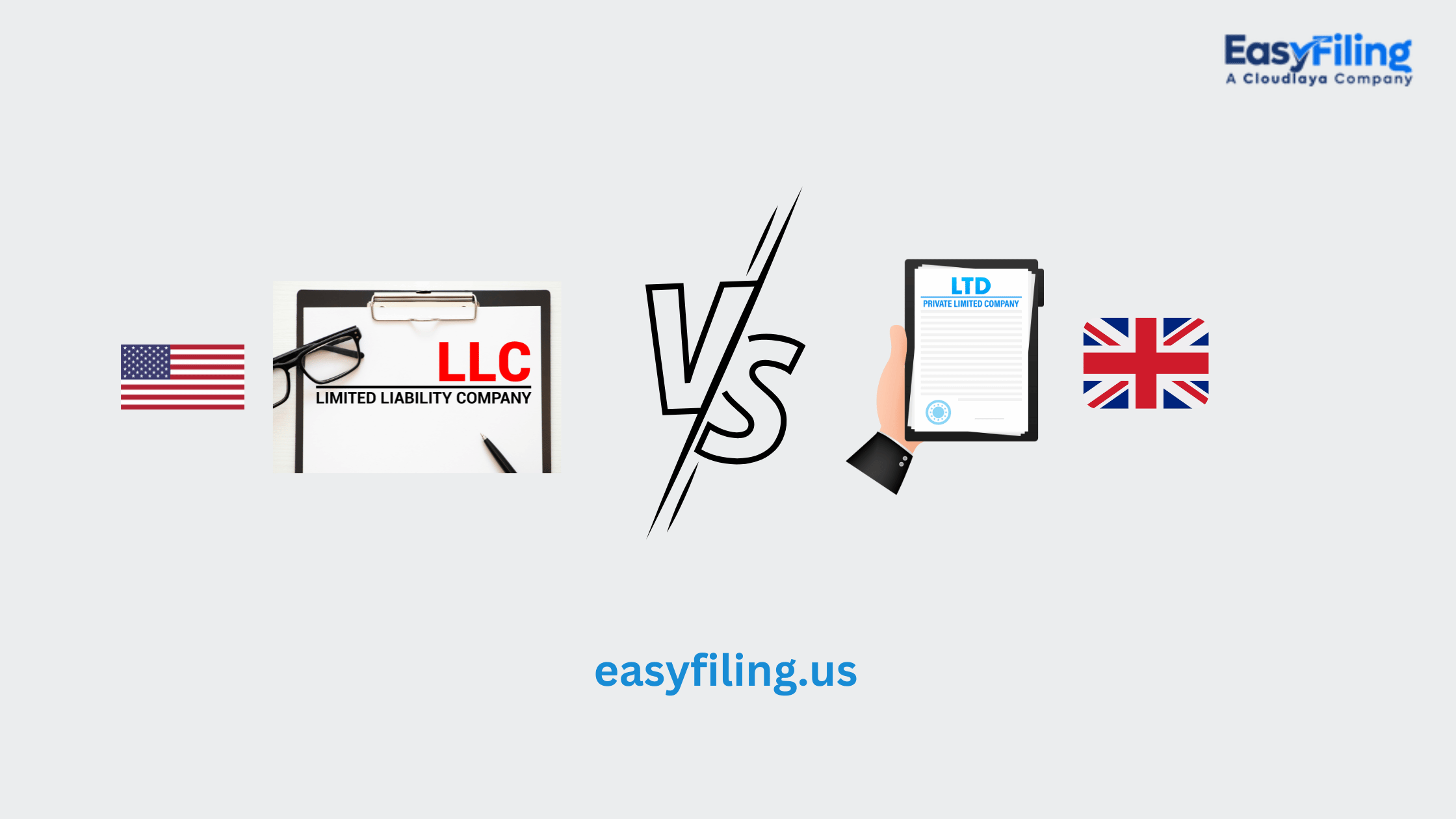When starting a business, choosing the right type of entity is critical. Two common options are LLC in the US vs Ltd in the UK. While both offer limited liability protection, they differ in terms of taxation, formation, and management. In this blog post, we’ll explore the differences between LLCs and Ltds and help you determine which is the better choice for your business.
What is an LLC?
An LLC stands for Limited Liability Company. It’s a legal form of a company that provides limited liability to its owners in many jurisdictions. LLCs are well-regarded for their flexibility in taxation, organization, and the ability to shield personal assets from business debts and liabilities. Unlike corporations, which are required to have a fixed management structure and meet annual reporting requirements, LLCs enjoy fewer formalities and greater operational flexibility.
The Advantages of Forming an LLC
1. Limited Liability Protection: An LLC shields personal assets from business liabilities, ensuring personal property like homes and savings are safe if the business encounters legal issues or bankruptcy.
2. Tax Flexibility: LLCs benefit from pass-through taxation, avoiding direct taxes. Profits and losses are reported on the owners’ tax returns, preventing the double taxation faced by corporations. LLCs can opt to be taxed as corporations if it’s more favorable.
3. Management Versatility: LLCs offer flexible management structures. Owners can manage directly (member-managed) or appoint managers (manager-managed), perfect for owners who prefer a hands-off approach.
4. Fewer Formalities: LLCs face simpler operational requirements than corporations, often exempt from holding annual meetings, recording minutes, or having a board of directors, although this can vary by state.
5. Credibility and Brand Protection: Forming an LLC enhances your business’s credibility and protects your brand name within your state.
What is an LTD?
An LTD, short for “Limited Company,” is a widely recognized business structure, particularly in the UK, Ireland, and other Commonwealth countries. At its core, an LTD is a legal entity entirely separate from its owners, providing a key advantage: limited liability. This means that the personal assets of the shareholders or owners are protected; they are only responsible for business debts up to the amount they have invested or guaranteed to the company.
The Advantages of Forming an LTD
1. Limited Liability Protection: A key benefit of an LTD is limited liability for owners. Shareholders only owe what their shares are worth, lowering business risk.
2. Professional Credibility: An LTD boosts a business’s credibility with customers, suppliers, and investors, appearing more stable and trustworthy.
3. Tax Efficiency: LTDs offer tax advantages, especially with corporation tax and dividends. Profits are taxed at the corporation tax rate, often lower than personal income tax rates for sole traders or partnerships. Dividends can also mean less personal tax.
4. Ownership and Succession: An LTD’s clear ownership structure, through share issuance, makes selling or transferring ownership easier, supporting succession planning and longevity.
5. Raising Capital: Limited companies find it easier to secure financing due to their ability to issue shares and their higher credibility, attracting investors and loans more effectively.
6. Separate Legal Entity: An LTD exists independently, able to contract, own property, and undergo legal actions, protecting owners and simplifying operations.
The Disadvantages of Forming an LTD
1. Complex Setup: Starting an LTD involves more legal paperwork and steps than sole proprietorships or partnerships. It requires strict governance and tasks like filing annual accounts, necessitating detailed record-keeping.
2. Public Disclosure: LTDs must make financials, director details, and office addresses public through the Companies House, lowering privacy for owners.
3. Funds Withdrawal Rigidity: LTD directors and shareholders face limits on fund withdrawals, categorized as salary, dividends, or loan repayments, each with distinct tax consequences, reducing flexibility.
4. Tax Disadvantages for Small Profits: For small-profit businesses, LTDs may be less tax-efficient because of corporation tax, income tax on salaries, and dividend taxes, resulting in a higher tax load than for sole traders or partnerships.
5. Legal and Financial Risks: While LTDs provide limited liability protection, directors can be personally liable for wrongful acts. Personal guarantees for business loans often reduce the advantages of limited liability.
Differences between LLC and LTD
Formation:
In the United States, forming an LLC is relatively easy and can be done online. All you need is an official name, an official address, and members or owners who have to sign an operating agreement. The process can take as little as 24 hours in some states, and the startup costs are usually under $500.
On the other hand, forming a Ltd in the United Kingdom is more complex, as it requires a registered office, a company secretary, at least one director, and one shareholder. The process can take several weeks with costs that can run several thousand pounds.
Taxation:
LLCs in the United States are treated as pass-through entities, which means that the profits and losses are attributed to the owners or members, who are responsible for reporting them on their individual tax returns. This can be an advantage as it can allow for more deductions, but it also means that LLCs are subject to self-employment taxes.
In the UK, Ltds are taxed based on their profit, and their owners or shareholders are not personally liable for the taxes. However, UK corporation tax rates are higher than personal tax rates, and dividends paid to shareholders are subject to additional taxes. That means that it can be more expensive to operate a Ltd in the UK.
Management:
LLCs in the United States offer a lot of flexibility in terms of management, as owners can choose among a single-member structure, a member-managed structure, or a manager-managed structure. A single-member LLC is managed by the owner, while a member-managed LLC is managed by all members. A manager-managed LLC is managed by one or more managers, who do not have to be members.
LTDs in the United Kingdom, on the other hand, have a more rigid structure. They have to have at least one director, who is responsible for running the company, and they have to have a company secretary who maintains company records and ensures that the company complies with regulations. The director can be held personally liable for the company’s debts if he or she does not fulfill his or her duties.
Conclusion:
Both LLCs in the United States and Ltds in the United Kingdom offer limited liability protection, but they differ in terms of formation, taxation, and management. If you’re looking for an easy and affordable way to form your company, and you wish to have more flexibility in terms of management, then an LLC in the United States may be the best choice for you. If you’re looking for a more established and internationally recognized structure, and you’re prepared to deal with more complex formation and higher taxes, then a Ltd in the United Kingdom may be the best choice for you. Always consult with a local attorney or accountant to determine which is the best option for your specific situation.
At EasyFiling, we specialize in providing company services exclusively for the US. We regret to inform you that we do not offer support for UK ltd formation services. However, if you are interested in establishing a US LLC, please feel free to contact us. Our team of experts is always ready to assist you. Invest in the future of your company and ensure that it is secure by choosing the right structure for your needs.
LLC or Ltd, the choice is yours! So, don’t wait any longer – form your limited liability company today and start paving the way towards business success. We are here to help you every step of the way. Keep in mind that as your business grows and evolves, you may need to re-evaluate your company’s structure. It is always important to stay informed and make the necessary changes to protect yourself and your assets. Remember, choosing a limited liability company is a smart decision that can benefit both you and your business in the long run.
FAQs
What are the key differences between an LLC in the U.S. and an LTD in the U.K.?
Both the LLC and LTD are popular types of business entities, but they have several key differences. While an LLC is a flexible structure offering its members limited liability in the U.S, an LTD, short for a private limited company, is a business structure in the U.K. where the liability of shareholders is limited to their share of investment in the company.
Is an LLC in the U.S. better than an LTD in the U.K.?
It depends on the goals and operations of your business. Both structures provide limited liability protection, but an LLC in the U.S. offers more operational flexibility while an LTD in the U.K. might present more credibility to clients or investors due to its stricter regulatory environment.
Can a non-resident form an LLC in the U.S. or an LTD in the U.K.?
Yes, non-residents can form both an LLC in the U.S. and an LTD in the U.K. However, they should consult with a legal or business advisor to fully understand the tax implications and legal requirements in each case.
How does tax treatment differ between an LLC in the U.S. and an LTD in the U.K.?
In general, an LLC in the U.S. is considered a pass-through entity for tax purposes, meaning the company itself isn’t taxed. Instead, the profits and losses pass through to the owners who report them on their personal tax returns. On the other hand, an LTD in the U.K. is subject to corporation tax on its profits, with shareholders then taxed on any dividends they receive.
Can an LLC in the U.S. convert to an LTD in the U.K., and vice versa?
It is not possible to convert, but you can dissolve and then form another company, or vice versa. Alternatively, you can open a new company owned by the older company.








